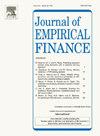Co-illiquidity management
IF 2.1
2区 经济学
Q2 BUSINESS, FINANCE
引用次数: 0
Abstract
We study the link between illiquidity and co-movement in illiquidity and the way asset managers trade off illiquidity and co-illiquidity in their portfolio allocation decision. By exploring two experiments – the 2005 SHO Regulation and 2016 Tick Size pilot program – we document the way fund managers manage co-illiquidity risk and the implication for the market degree of illiquidity and co-illiquidity.
Co-illiquidity管理
本文研究了非流动性与非流动性协同运动之间的联系,以及资产管理者在其投资组合配置决策中权衡非流动性与协同非流动性的方式。通过探索两个实验——2005年的SHO监管和2016年的Tick Size试点项目——我们记录了基金经理管理共同非流动性风险的方式,以及对非流动性和共同非流动性的市场程度的影响。
本文章由计算机程序翻译,如有差异,请以英文原文为准。
求助全文
约1分钟内获得全文
求助全文
来源期刊

Journal of Empirical Finance
Multiple-
CiteScore
3.40
自引率
3.80%
发文量
59
期刊介绍:
The Journal of Empirical Finance is a financial economics journal whose aim is to publish high quality articles in empirical finance. Empirical finance is interpreted broadly to include any type of empirical work in financial economics, financial econometrics, and also theoretical work with clear empirical implications, even when there is no empirical analysis. The Journal welcomes articles in all fields of finance, such as asset pricing, corporate finance, financial econometrics, banking, international finance, microstructure, behavioural finance, etc. The Editorial Team is willing to take risks on innovative research, controversial papers, and unusual approaches. We are also particularly interested in work produced by young scholars. The composition of the editorial board reflects such goals.
 求助内容:
求助内容: 应助结果提醒方式:
应助结果提醒方式:


